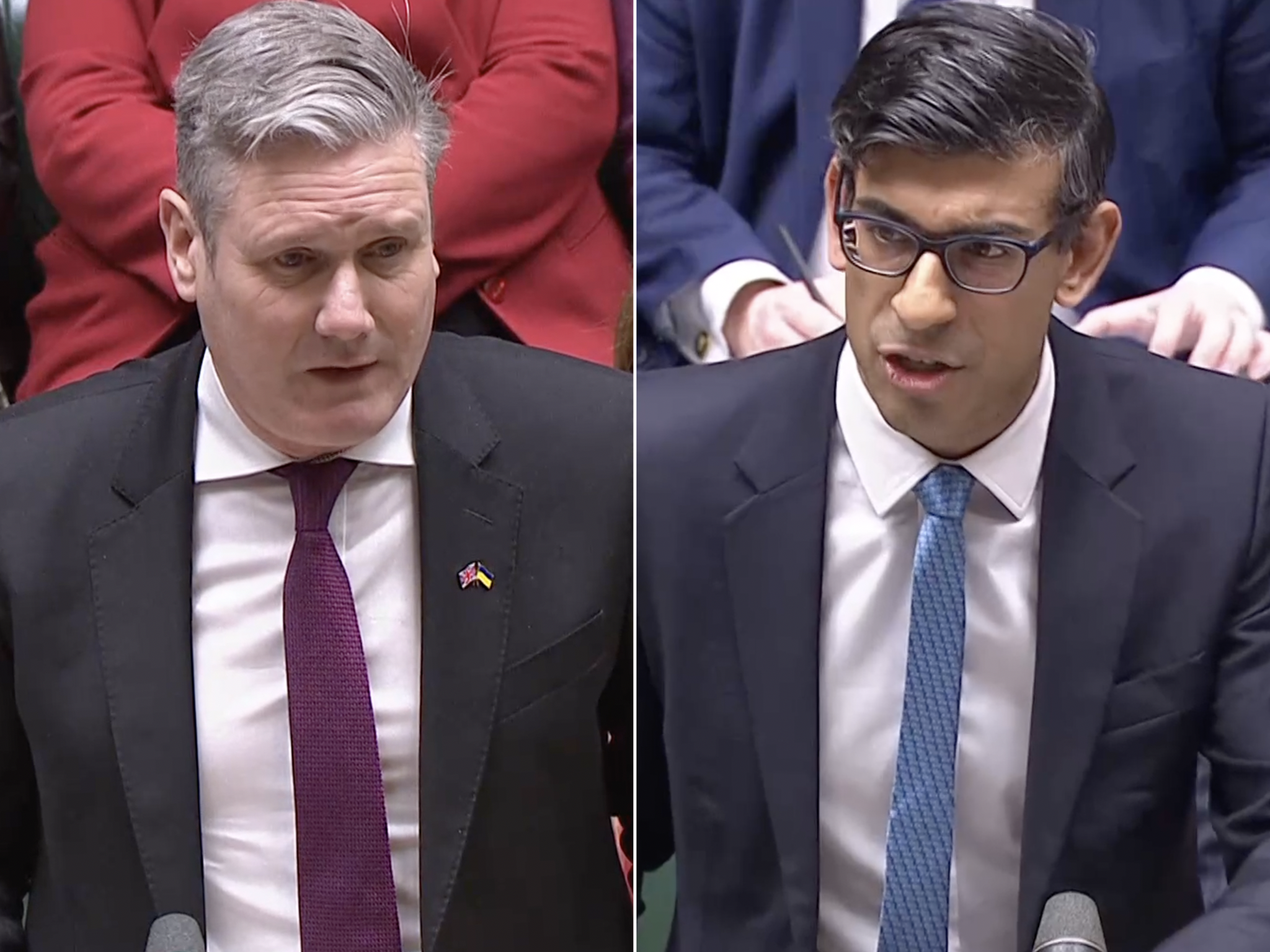The battle lines for next year’s general election have been drawn
The Tories are struggling to land blows on the elusive Starmer, writes Andrew Grice


The battle lines for next year’s general election were drawn this week, as Rishi Sunak’s five pledges were followed by Keir Starmer’s five missions.
The Tories shouldn’t take any comfort from the apparent vagueness and blandness of Starmer’s offer, which was apples to Sunak’s pears. Starmer’s long-term goals are a good antidote to the “sticking plaster” crisis management of the Tories. This clever attack line will surely resonate with voters who have seen one “winter crisis” in the NHS being followed by the build-up to the next, and the chaos of the Johnson and Truss premierships.
Sunak’s designed-to-be-met short-term targets, such as “halving inflation” when all forecasts suggest that will happen, are necessarily short-term to show that the Tories can still provide stability and competence. Starmer’s goals will be followed by a more voter-friendly “retail offer” on bread-and-butter issues at a point closer to the election.
Senior Labour figures judge that the party’s biggest enemy is not the clapped-out Tories, but voter cynicism about the idea that things really can get better, coupled with a sense that our untrustworthy politicians are “all the same”. Starmer wants to raise the public’s sights to a sunny horizon.
His talk of a 10-year “mission-driven government” is in part a recognition that the fiscal straitjacket Labour would inherit would limit what it could achieve in one five-year term.
Long-term planning and closer cross-departmental working in Whitehall are sensible ideas, but they would not silence the ticking clock of the next election that haunts all governments. (Even after winning two huge majorities, Tony Blair immediately fretted about the next election.)
As well as that, there are the unexpected events that divert every administration.
Conversely, Sunak will offer his long-term vision closer to the election, as he tries to counter Labour’s “time for change” mantra with a plea, against the backdrop of an improving economy, for a chance for the Tories to finish the job. But the inevitable other half of the Tories’ pitch – “Don’t risk a Labour government” – is proving the hardest part.
The Tories are struggling to land blows on the elusive Starmer. They can’t decide whether he’s a left-wing wolf in sheep’s clothing who plots to deliver Corbynism, or an opportunist with no principles; it can’t be both. Yet Sunak tried to have it both ways at Prime Minister’s Questions, joking that Starmer’s five missions are “uncontrolled immigration, reckless spending, higher debt, softer sentences... and the fifth pledge ... is that he reserves the right to change his mind on the other four.”
Starmer’s freezing out of Jeremy Corbyn has been noticed by voters, so the Tories risk repeating their mistake of portraying Blair with “demon eyes” when the public saw him as Bambi. Although some Labour MPs worry that Starmer’s ditching of much of his 2020 leadership election manifesto makes him look “not quite what he seems”, his aides view this as a “Westminster bubble” story, and think that voters are more willing to respect politicians who change their minds than the bubble believes. It is true that his U-turns remind the public that he is “not Corbyn”.
However, Labour will need to enthuse and excite voters; it cannot let the election be a choice between two technocrats. Sunak’s incumbency would then become an asset, especially if he managed to display strong leadership. (When Team Starmer branded the prime minister “weak”, they didn’t really expect the label to stick, but they are pleasantly surprised that Sunak has so far lived up to the image Labour wanted to evoke.)
Starmer’s ambitious mission to make Britain a “clean-energy superpower”, with zero-carbon electricity by 2030, could provide the excitement he needs, especially for younger adults. It would be good for the economy, jobs and the planet.
The Tories have too much ideological baggage to match it, standing helplessly on the sidelines as the US and EU prepare billions in subsidies for their green industries. It was odd that Starmer didn’t mention housing in yesterday’s speech in Manchester, since the Tories have flunked the housebuilding challenge (to the dismay of aspiring homeowners). And Starmer will not escape scrutiny on immigration by ignoring the issue.
However, Sunak has more to worry about than his opponent. Tory strategists hoped he would raise the party’s poor ratings, but instead its tarnished brand is dragging his ratings down. Worryingly for the Tories, any new party leader normally has three months to make an impact on voters; once they have made up their minds, the verdict is hard to shift.
Sunak has now been PM for four months. Opinion polls suggest he chose the right issues for his five pledges – but, crucially, that Starmer is more trusted to deliver those that voters regard as the most important: on the NHS and growing the economy.
Though Sunak does remain popular in his party, he needs Labour to make mistakes, as the party has done in the past when it seemed on course for victory. Starmer’s confident but not overconfident speech reminds us that he’s unlikely to repeat this. He holds the best cards, and the election is Labour’s to lose.






Join our commenting forum
Join thought-provoking conversations, follow other Independent readers and see their replies
Comments